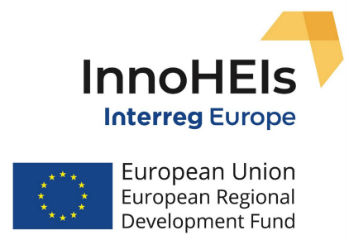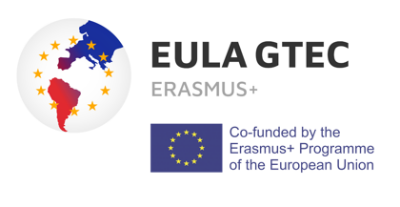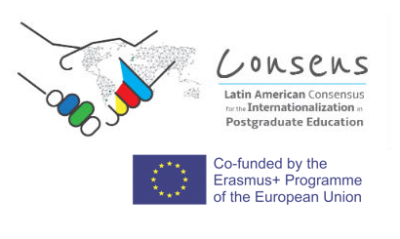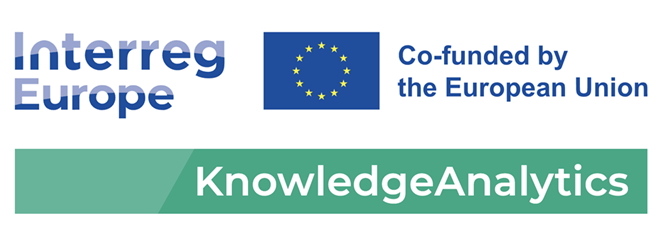Faculty's European Projects

The InnoHEIs project aims at expanding the role of universities (HEIs) and their research and innovation infrastructure (RII) as key agents for the development of regional innovation. Encouraging entrepreneurship and creativity brings many benefits to HEIs and regions. The InnoHEIs project addresses the challenge of improving the role of HEIs RII as a facilitator of the entrepreneurial discovery process (EDP), which is an inclusive and interactive bottom-up process in which participants from different environments (policy-making, companies, academics , etc.) discover possible new activities and opportunities that arise from this interaction. Universities, with their human infrastructures and capabilities, can create collaborations that facilitate the integration of fragmented and distributed business knowledge in many organizations, companies, universities, customers and users. Thus, the members of InnoHEIs study the possibilities of mobilizing these RIIs for the development of regional innovation by eliminating barriers between different types of RII, improving their and inter-sectoral collaboration.
The strategic objective of InnoHEIs is to create a favourable environment with the aim of improving the use of the infrastructure of innovation through a better involvement of its users and customers and a greater scientific and industrial collaboration. Partners will collaborate to improve the RII performance of HEIs that respond to regional needs and demands through open cooperation methods, co-creation, demand and approaches, driven by users and to address the social challenges of society.
More information at: https://www.interregeurope.eu/innoheis/
Project PR: Ricard Esparza Masana (ricard.esparza@uab.cat)

• To develop, test, and implement an international pilot experience, run by LA and EU HEIs, based on a master degree for promoting TIM in SMEs, using blended learning instruments.
• To increase the relevance of LA and EU HEIs in the connection process between research and
innovation, within a Circular Economy approach.
• To build a collaborative international network with HEIs, SMEs, technology brokers, R&D centres, local and national authorities, and different actors involved into the innovation process, for designing and implementing the pilot experience.
These aims are convergent into one main unique target of the project, which is:
► To promote the creation of new academic profiles that allow the generation of creative links between the research centres/universities and the socio-productive sector, and foster innovative sustainable solutions for both regions based on new and/or innovative technologies or solutions.
This project is led by the National University of Luján (Argentina) and co-led by the UAB. In addition, other Latin American universities (in Peru, Brazil and Argentina) as well as in the EU (in France, Portugal and Italy) participate.
More information at: https://eula-gtec.unlu.edu.ar/
Project PRs: David Urbano (David.Urbano@uab.cat) & Ricard Esparza Masana (Ricard.Esparza@uab.cat)

In this context, different European universities, including the UAB and other universities in France, Italy and Spain, provide support and advice to universities in Argentina and Paraguay to implement pilot tests in postgraduate programs in different fields of knowledge, based on the four Main axes of the project: credit system, competencies, student-based education, and quality systems, each European university advising on the chosen fields of knowledge.
The project will also generate synergies between European and Latin American universities for the exchange of knowledge, mobility of teachers and students, and possible ways of future collaboration.
More information at: http://www.consensproject.org/
Project PRs: David Urbano (David.Urbano@uab.cat) & Ricard Esparza Masana (Ricard.Esparza@uab.cat)

Due to the rapid advances in data analytics (technologies, methods, skills), decision-making is increasingly driven by evidence. The application of advanced analytics holds immense potential to promote efficiency in a wide range of fields, and knowledge transfer between science and business, as well as the valorisation of knowledge, is no exception.
Aware of this opportunity, KnowledgeAnalytics aims to explore the opportunities offered by artificial intelligence, big data, data scraping, data visualization, and other technologies to develop efficient public interventions dedicated to supporting knowledge transfer.
The adoption of advanced analytics in R&D&I policy is especially important to advance towards evidence-based and goal-oriented policy interventions. However, this transition is challenging not only for public sector organisations (policymakers, policy analysts) but also for scientific and research organisations, the business community, and other stakeholders, as it requires the application of new working methods and technologies, expanded skills, and the implementation of changes in organisational culture, data management, etc.
Therefore, KnowledgeAnalytics will facilitate:
- mutual learning,
- knowledge exchange,
- and capacity building among the participating territories (Lithuania, Slovakia, Czech Republic, Spain, Finland, Belgium, and Estonia) to learn from each other about the solutions and technologies developed and applied to support evidence-based KT (knowledge transfer).
In summary, KnowledgeAnalytics will improve regional and national policies to accelerate the efficient transition towards a knowledge-based economy, where knowledge is applied beyond research institutions to develop new products, services, or solutions useful for social and economic development.
The project will last for 4 years and 3 months (from April 1, 2024, to June 30, 2028). In addition to UAB, the other project partners are: the Research Council of Lithuania, the Lithuanian Innovation Centre, the Slovak Innovation and Energy Agency, LAB University of Applied Sciences (Finland), the Czech Technology Agency, the University of Mons (Belgium), and the Estonian Research Council.
Project PI: Ricard Esparza Masana